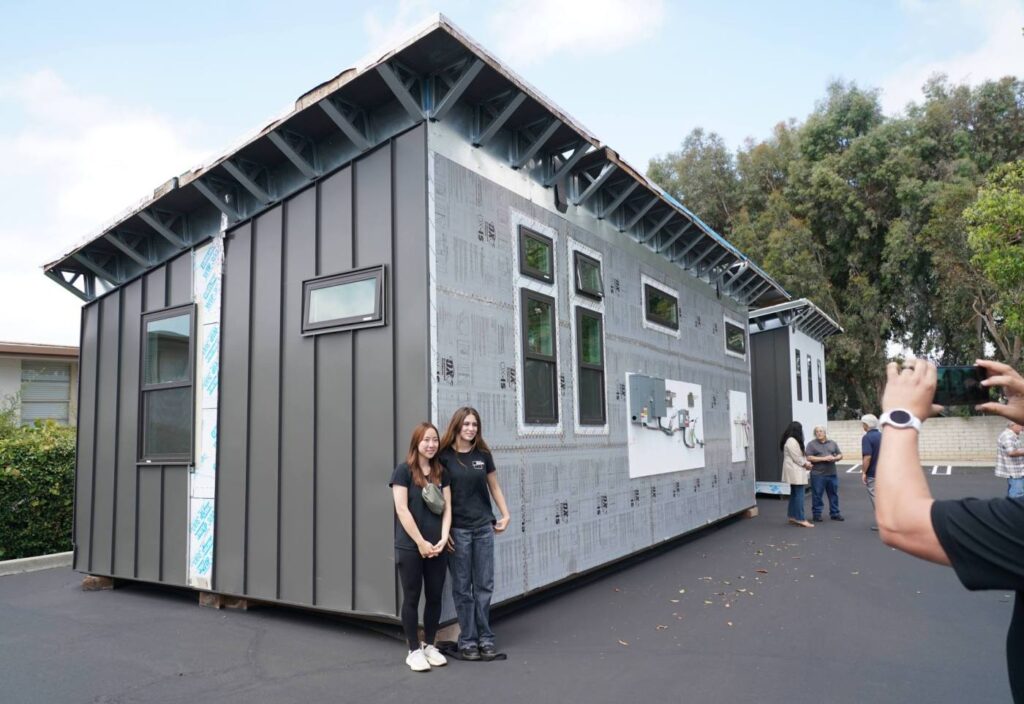
A small house built by Orange County college students was donated to a Homeless Intervention Services of Orange County shelter in Placentia, doubling the number of young adults the program will be able to support.
The home, which is considered an accessory dwelling unit, will house foster youth who have aged out of the system.
The modular unit was designed and built by a group of 30 students from UC Irvine and Orange Coast College as part of the inaugural Orange County Sustainability Decathlon. The competition brought together college students to not only get hands-on architecture experience, but to do so with affordability and sustainability in mind.
“The ADU gifted from UCI and OCC is going to give us the ability to expand our program. Currently with just the home that we have, we can serve up to nine individuals, both male and female,” Alfa Hernandez, program director at HIS-OC, said. “With the expansion of the ADU coming into the backyard of our home. We’re going to go from nine beds to 17 beds. So it’s going to allow us to reach more individuals that are in need.”
This specific group of youths, ages 18 to 24, are “good at hiding,” Hernandez said, meaning they can be more difficult to reach with services.
“They usually try to hide, in their cars and anywhere, but bringing them here and giving them structure, which is what the program does, it gives them that structure, it allows them to learn life skills,” Hernandez said. “A lot of them come up from broken homes, age out of the foster care system, some their parents kick them out for different reasons, and they don’t have that foundation, that basic safe foundation that they need.”
Orange Coast College students Yuka Suzuki and Georgie Ampudia said the experience building the small house was “life-changing,” and knowing the unit will be used for housing youths on the brink of homelessness has made the project all the more fulfilling.
“It’s nice knowing that what we’re building has a purpose,” Ampudia said. “Working with HIS-OC has been really huge because we’re tackling an actual housing crisis that’s going on. That’s the goal. It’s to help the housing crisis while simultaneously tackling climate change.”
Ampudia said she’ll truly feel like their work is done once the ADU is set up in the shelter’s backyard and folks have been moved in.
HIS-OC staff celebrated the expansion Wednesday and will soon start prepping the space – taking down a fence, cutting a couple of trees and more – before transporting the unit. The organization is working with the city of Placentia to ensure the ADU meets all city building requirements, Hernandez said.
It will cost approximately $160,000 to transport the unit, as well as build out the plumbing, water and solar power systems. More fundraising is needed, Hernandez added.
“We’re rapidly trying to get funding and looking for donations, but the next step would be breaking down the fence at the back of the house, laying down the foundation and getting all the permits,” Hernandez said.
Mike Moodian, a Chapman University professor and cofounder of the Orange County Sustainability Decathlon, said the “sky’s the limit” for the students who designed and built the home.
“These 30 students from a community college, Orange Coast College, and a research university, UCI, spent more than a year designing and building a highly sustainable, ultra-efficient, innovative home for this major competition,” Moodian said. “Now, it’s being used at a site to house individuals who aged out of the foster system. That is incredible. Who else can say that they accomplished this during their college years?”
Related Articles
State Sen. Ben Allen pulls housing ballot measure, pushes climate change bond
Three old motels are now new affordable housing communities in Stanton
Anaheim nearing deal to acquire another Beach Boulevard motel
Homelessness was down during pandemic, so how do Orange County communities replicate that?
Restaurant and church identified as possible affordable housing spots in Laguna Beach
